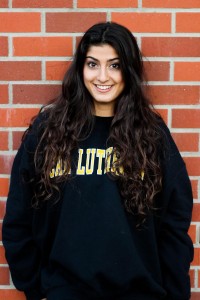Major: Exercise Science
Minor: Psychology
Kristin is taking part in the pre-med advising program, which helps her connect with other students interested in a career in medicine, as well as prepare for med school applications and take classes that cover subjects found on the MCAT.
How did you find out about the pre-med program?
I found out about the AMSA club from meeting the prior president of AMSA at a social event, and he told me all about the club and what it involves. He definitely made the club seem very fascinating and I knew it would be great to get involved in.
How did you get started?
A week after learning about AMSA, I signed up at a club booth, and from that point on I received all the emails and participated in all the events and attended all of the meetings.
What has been the most valuable part of your experience?
The most valuable portion of the pre-med program for me has been meeting other like-minded students who have similar goals. It is a long road to medical school, and it is helpful to have other students that have the same ambitions so we can help each other through the process.
Have you done any research?
I am currently doing research with Dr. Kelly, one of the professors of the Exercise Science Department. I, along with a few others, am looking for risk factors leading to metabolic syndrome in Cal Lutheran D3 athletes. I have really enjoyed this research and am hoping to co-author the paper with Dr. Kelly and a few others, and as soon as that gets wrapped up, I know I will get started with some more research in that department.
Do you have any advice for future pre-med students?
I would really recommend getting to know your professors. This allows you to learn how to establish a mature relationship in which you can learn to socialize with professionals, and it also just makes it that much easier to approach them. It is important to make connections and learn from their expertise. It is also one of the benefits of being at a small school and something that many students from large state schools do not have the chance to benefit from. I also really recommend shadowing or finding out what it is like to be a practicing physician. Many pre-meds have an unrealistic view of what being a doctor is like, and I find it helpful to see what the day-to-day practice is like so you can determine if medicine is right for you.
Why do you want to become a doctor?
I want to become a doctor because it would give me the opportunity to use my knowledge and compassion in assisting others — as well as working alongside other healthcare providers who share the same desire. Over the past five years, I have been volunteering in a hospital, and I have observed that doctors are always learning valuable lessons in this field. Overall, I can see the joy that stems from making others’ lives easier and eventually I will be able to help heal those in need, and when I do that, I know I will be rewarded with the upmost contentment. I cannot wait to make a positive difference in patients’ lives.

